When I tell people I work in digital marketing, I get one of two responses.
A glazed over look that tell me this person finds my vocation to be an instant sedative. Or an excited response, like they’ve found out we are long lost cousins because they:
a) have a blog,
b) are into affiliate marketing,
c) just signed up for an amazing online marketing course,
d) have a friend who makes a living off instagram, or
e) any of the thousands of other connections to the world of digital marketing.
Don’t get me wrong, I love the second response of the two above.
But what it demonstrates is just how many different ways there are to potential get eyes on your website. And it’s confusing.
Some people swear by social media and tell you to build a following on Twitter or Instagram.
Others say the key is to be found on large existing sites like Amazon with your own product or book.
Then there are those who say if you want to be read, reach out to influencers and get published as a guest blog.
Some go a step further and say all you need is good, high quality traffic and Google will do the rest.
Or you could turn your hand to one of the myriad of advertising solutions out there.
No doubt all have their fans and all have been used to drive traffic and make sales. But the truth is listening to the millions of voices on this is just plain confusing. How do you know which approach is the best for you and which traffic strategy has the best track record?
Well I’m glad you asked.
Which Traffic Channel is Best?
Let’s define what different traffic channels there actually are first of all.
PAID: Anything that comes from paid advertising including Adwords, Facebook ads, display ads on Google’s or other networks.
SOCIAL: Anything that comes from a social media channel – Twitter, Google+, Facebook, Instagram are the big ones
REFERRAL: Any traffic that comes via another website, such as a link on another blog, an author profile, a mention.
DIRECT: Any traffic that comes from someone typing in your URL or using a bookmark
ORGANIC: Any traffic that comes via an organic result in a search engine
This covers all your key traffic channels and you can find the breakdown of your traffic if you have Google Analytics installed.
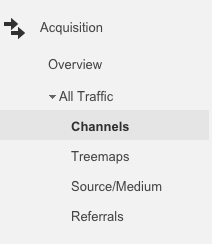
So Which One Works Best?
Ok Bruce, enough of the analytics lesson – cut to the chase. Which traffic source is best?
In my experience and with the backing of the data at hand, organic search provides you with the best source of traffic, the highest quality and potentially the greatest quantity of all the different traffic sources.
Quantity: Which Source Delivers the Most Traffic?
Looking at your Google Analytics will reveal the breakdown of your traffic by channels. Obviously this is going to vary site by site. You may be driving traffic through an active engagement on twitter, or through Facebook ads, or through Google’s display network. This will be seen in your GA.
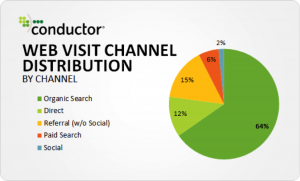 But taking a step back, what drives the most traffic across the web? Where can you go to acquire the greatest share of traffic?
But taking a step back, what drives the most traffic across the web? Where can you go to acquire the greatest share of traffic?
According to Conductor Spotlight blog, a study they conducted into 310 million web visits revealed “that organic search traffic might be responsible for closer to 64% of website traffic“. Whilst their study was into the misreporting of some organic traffic as direct, their conclusions were striking:
Organic Search is Responsible for a far Greater Percentage of Web Site Traffic than Originally Thought. The question of what percentage of our websites’ overall traffic comes from organic search is an important one. In fact, there is arguably no single more important piece of information a search practitioner or marketing executive can have in budgeting, headcount or strategy decisions.
Similarly, BrightEdge conducted a study into traffic sources and found organic search was the dominant driver of traffic. It found organic search drives 51 percent of all visitors to B2B and B2C websites, trumping all other non-organic search channels, including paid search (10%) and social (5%).
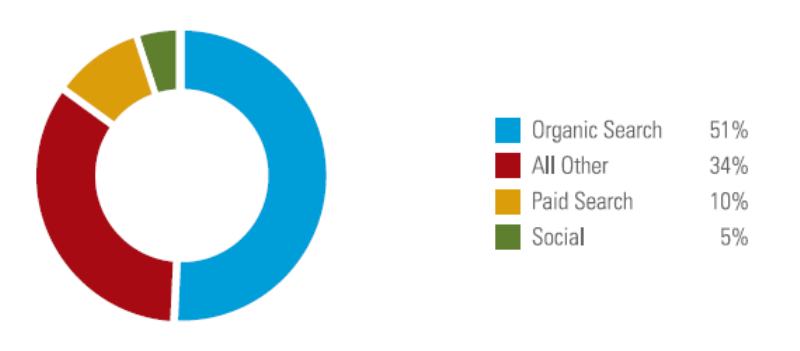
This data was the aggregated results of examining “billions of pieces of content” (according to the report). But how does this play out across different markets and niches?
The data does vary across different industries, showing different methods of reaching your market can have varying degrees of reach. From business services receiving 71% of traffic via organic search to retail at 42%, across the board organic traffic comes out number one.
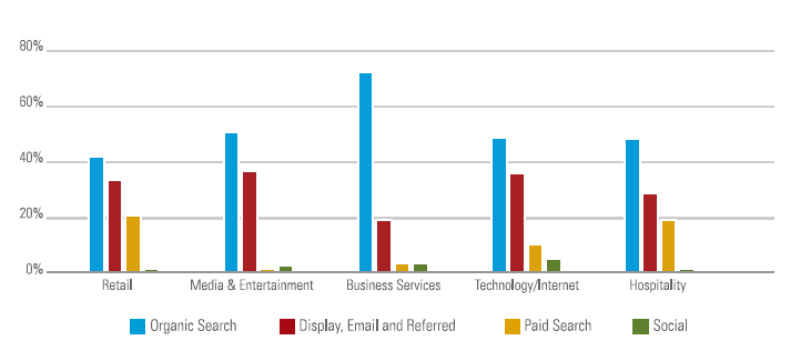
If you want the greatest slice of web traffic, organic search traffic – that is the visits driven by having your site rank in the search engines – is a non-negotiable.
Quality: Which Traffic Source Converts the Best?
Ok, so organic traffic drives the MOST traffic, but does it drive the BEST traffic? It’s a good question because traffic for the sake of traffic is not the end goal. The end goal is to drive leads and sales. So what traffic source drives the highest quality of traffic? Which traffic source converts the best?
There have only been a handful of studies done on this (most that only cover a small sample size) which makes a definitive answer difficult. Whilst you should always go where your prospects are, there is one other principle to keep in mind here.
Are your prospects searching for what you offer, or are you attempting to interrupt they other online activities?
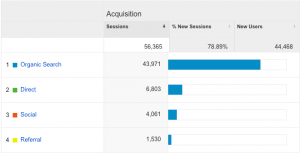 Search traffic (SEO & SEM traffic) leverages the fact the user is actively looking for something online, usually via a search engine. They are seeking a service, products or information but they are giving a very good indication of what they are seeking by their search query. Smart marketers will match their content to the specifics of the query, and doing so is likely to deliver traffic that converts.
Search traffic (SEO & SEM traffic) leverages the fact the user is actively looking for something online, usually via a search engine. They are seeking a service, products or information but they are giving a very good indication of what they are seeking by their search query. Smart marketers will match their content to the specifics of the query, and doing so is likely to deliver traffic that converts.
On the other hand, non-search traffic sources are interruptive in nature. Be that a shared link via twitter, content seen on Facebook, banner advertising and the like; the intent of the user’s activity (browsing, reading, interacting with friends) is not closely aligned to the action of visiting your website. The result of this is we can expect that the quality of the traffic from non-search sources to be less likely to convert.
How do you capitalize on this greatest source of traffic?
It gets down to optimizing your website for search engines like Google. This is what we call search engine optimization or SEO.
Look out for more ways you can optimize your site for Google and drive more qualified traffic to it by getting on my Insiders’ List, where I am sharing premium content including strategies and tactics to drive more leads & sales to your site and more dollars to your pocket!
Get Access today!

Nice information thanks for share.